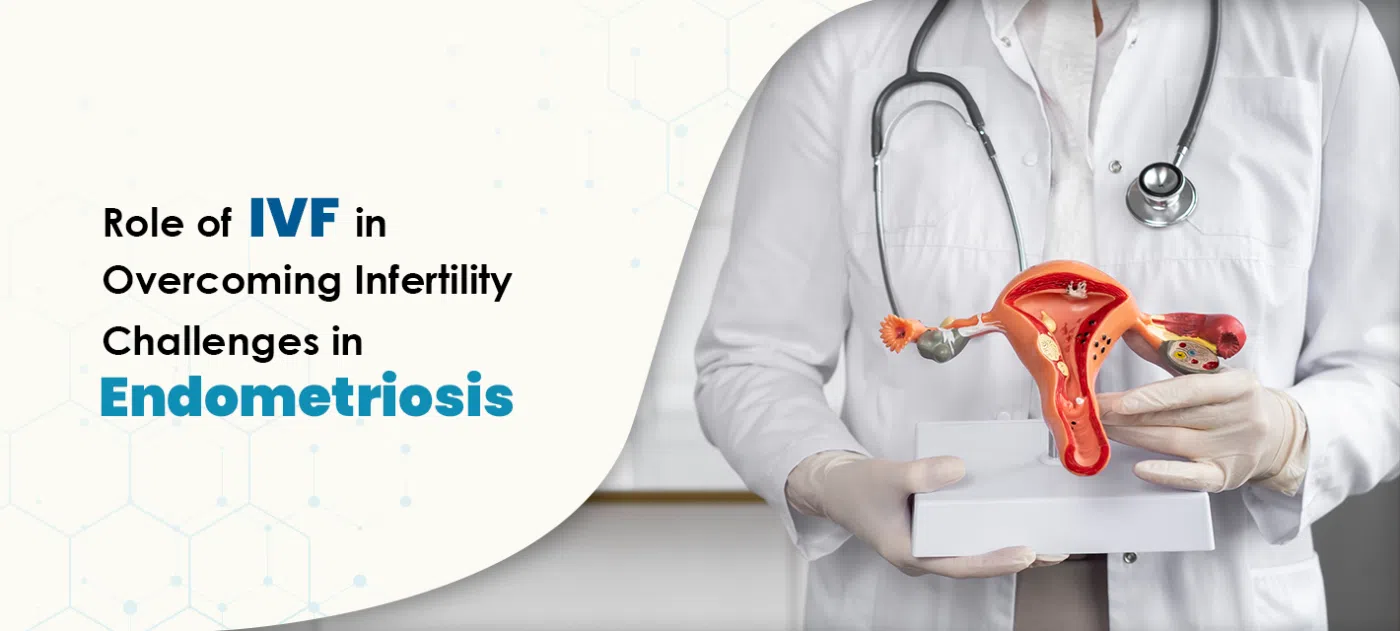Role of IVF in Overcoming Infertility Challenges in Endometriosis
Endometriosis is an often painful disorder in which tissue similar to the tissue that normally lines the inside of your uterus — the endometrium — grows outside your uterus. Endometriosis most commonly involves your ovaries, fallopian tubes and the tissue lining your pelvis. Rarely, endometrial-like tissue may be found beyond the area where pelvic organs are located.
Endometriosis can cause pain — sometimes severe — especially during menstrual periods. Fertility problems also may develop. Fortunately, effective treatments are available.
How Endometriosis Impacts Fertility
The uterus is lined with endometrial tissues that build up throughout a woman’s menstrual cycle. Endometrial tissues are released when a woman starts her period for women who have a healthy reproductive system. Unfortunately, many women suffer from endometriosis. Endometrial tissues become displaced when a woman suffers from endometriosis.
Displaced endometrial tissues may grow:
- Within the uterus
- Outside of the uterus
- Within the fallopian tubes
- Within the ovaries, or
- On other organs
Displaced endometrial tissues bleed while a woman is menstruating, but they will not be released. The remaining tissues can result in cysts, growths, scar tissue, or inflammation.
Endometriosis inhibits natural conception for several reasons. Excess tissue growing in the uterus can make it harder for an embryo to attach to the uterine wall. Endometrial cells attached to the ovaries or fallopian tubes can alter normal ovulation. On the other hand, it can block the fallopian tubes.
The excess tissues bleed during menstruation and can cause obstructive scar tissue when adhered to:
- Uterus
- Fallopian tubes
- Ovaries, and
- Other abdominal organs
Treatment options include hormone treatment and surgical intervention. However, IVF is the most effective solution for women who want to have a family.
Hormonal Treatment for Endometriosis
Hormonal treatment can treat the symptoms of endometriosis but it is not a cure. It will prevent ovulation and help to slow the growth and activity of both the endometrium and existing endometrial lesions. But it will not make existing adhesions go away. Oral contraceptives, birth control pills, and Gonadotropin-releasing hormone (GnRH) are generally prescribed. Patients with mild endometriosis may well become pregnant after this treatment.
Surgical intervention for Endometriosis
Surgical intervention is used to alleviate pain by removing endometriosis. This is done by dividing adhesions and removing cysts.
Conservative surgery, which aims to remove or destroy the deposits of endometriosis, is usually done via laparoscopy (keyhole surgery). This can improve fertility in women who have mild or minimal endometriosis.
A more complex option involves surgery on affected organs such as the bowel or the bladder. Radical surgery involves the removal of the womb (hysterectomy) or the removal of the ovaries (oophorectomy). This is only proposed to women who have not responded to hormone treatments or conservative surgery. And, also for those who are not planning to start a family.
How Can IVF Help in Endometriosis
In vitro fertilization (IVF) can be a valuable treatment option for women with endometriosis who are struggling to conceive.
IVF involves the fertilization of eggs with sperm in a laboratory setting. The resulting embryos are then transferred to the uterus, where they can implant and develop into a pregnancy. IVF is often used when other fertility treatments have failed. It is particularly effective for women with endometriosis.
One of the main reasons why IVF is a successful option for women with endometriosis is that it bypasses many of the obstacles that endometriosis can create in the reproductive system. Endometrial tissue can cause scarring and adhesions in the fallopian tubes. This can impede the passage of eggs and sperm. IVF allows the direct retrieval of eggs from the ovaries. The retrieved eggs are fertilized in the lab and transferred to the uterus, circumventing any issues in the fallopian tubes.
IVF can also be used to address other fertility issues that may be related to endometriosis, such as:
- Poor egg quality, or
- Low ovarian reserve
In these cases, women may undergo a process called ovarian stimulation. In this process, medication is administered to increase the number of eggs produced by the ovaries. These eggs can then be retrieved and fertilized in the lab, increasing the chances of a successful pregnancy.
Success Rate of IVF in the Case of Endometriosis
While IVF can be an effective treatment option for women with endometriosis, it is important to note that it is not a guaranteed solution.
Success rates can vary depending on a variety of factors, such as:
- Age
- Severity of endometriosis, and
- Quality of the eggs and sperm
Women considering IVF should consult with a fertility specialist to determine whether it is the right choice for them.
IVF can play a crucial role in helping women with endometriosis overcome infertility challenges. IVF can offer hope and a path to parenthood for those struggling to conceive by directly addressing the obstacles posed by endometrial tissue.
Consider discussing IVF with a fertility specialist if you or someone you know is dealing with infertility related to endometriosis. Discuss if it may be a viable option in your case.
Thank you for taking the time to read our blog on the role of IVF in overcoming infertility challenges in endometriosis. We hope you found it informative and helpful. If you or someone you know is struggling with infertility due to endometriosis, don’t hesitate to reach out to us.
Our IVF and fertility specialist doctors at Renew Healthcare are here to help you on your journey towards parenthood.
Please follow our page for more valuable insights on infertility treatments and solutions. Stay updated with the latest news and trends in the field of fertility. Take the first step towards fulfilling your dream of starting a family.
Call us on +91 6292 269060 to book an appointment.

